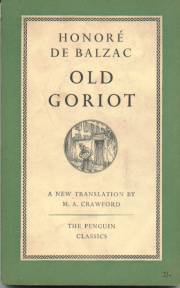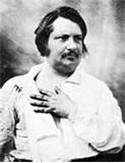Old Goriot by Honore de Balzac. Baltimore. 1951. Penguin Books. Translated From The French By M. A. Crawford. L17. 304 pages.
A young man's drive to succeed in 19th century Paris is tempered by his search for love.
 FROM THE PUBLISHER -
FROM THE PUBLISHER -
Le Pere Goriot was written between 1834-1835 when Balzac was 35 years old. He often worked around the clock in marathon sessions. It first appeared in serialized form in Revue de Paris in the Fall of 1834 and in completed book form in 1835. It is part of The Human Comedy, but as a stand-alone novel it represents Balzac's talents at their height in a complete form. Many of his novels were not always complete unto themselves, requiring other works to tie them together. Thus, Pere Goriot has been one of his most widely read novels, achieving such fame that the novel's protagonist, 'Rastignac', for the French, is synonymous with a bright young man determined to succeed - perhaps at any cost. Although the title character of Pere Goriot does appear in the book, the character at the center of the action is Eugene de Rastignac, a slightly idealistic and highly ambitious law student who lives in the same rundown boarding house in a seedy area of Paris as Goriot. Eugene decides to delay his studies for an attempt to enter into Parisian society, and chooses to pursue an affair with one of Goriot's married daughters.
 Honoré de Balzac (20 May 1799 – 18 August 1850) was a French novelist and playwright. His magnum opus was a sequence of short stories and novels collectively entitled La Comédie humaine, which presents a panorama of French life in the years after the 1815 fall of Napoleon. Due to his keen observation of detail and unfiltered representation of society, Balzac is regarded as one of the founders of realism in European literature. He is renowned for his multifaceted characters, who are complex, morally ambiguous and fully human. His writing influenced many subsequent novelists such as Marcel Proust, Émile Zola, Charles Dickens, Edgar Allan Poe, Fyodor Dostoyevsky, Gustave Flaubert, Benito Pérez Galdós, Marie Corelli, Henry James, William Faulkner, Jack Kerouac, and Italo Calvino, and philosophers such as Friedrich Engels and Karl Marx. Many of Balzac's works have been made into or have inspired films, and they are a continuing source of inspiration for writers, filmmakers and critics. An enthusiastic reader and independent thinker as a child, Balzac had trouble adapting to the teaching style of his grammar school. His willful nature caused trouble throughout his life and frustrated his ambitions to succeed in the world of business. When he finished school, Balzac was an apprentice in a law office, but he turned his back on the study of law after wearying of its inhumanity and banal routine. Before and during his career as a writer, he attempted to be a publisher, printer, businessman, critic, and politician; he failed in all of these efforts. La Comédie humaine reflects his real-life difficulties, and includes scenes from his own experience. Balzac suffered from health problems throughout his life, possibly due to his intense writing schedule. His relationship with his family was often strained by financial and personal difficulties, and he ended several friendships over critical reviews. In 1850 he married Ewelina Hanska, his longtime love; he died five months later.
Honoré de Balzac (20 May 1799 – 18 August 1850) was a French novelist and playwright. His magnum opus was a sequence of short stories and novels collectively entitled La Comédie humaine, which presents a panorama of French life in the years after the 1815 fall of Napoleon. Due to his keen observation of detail and unfiltered representation of society, Balzac is regarded as one of the founders of realism in European literature. He is renowned for his multifaceted characters, who are complex, morally ambiguous and fully human. His writing influenced many subsequent novelists such as Marcel Proust, Émile Zola, Charles Dickens, Edgar Allan Poe, Fyodor Dostoyevsky, Gustave Flaubert, Benito Pérez Galdós, Marie Corelli, Henry James, William Faulkner, Jack Kerouac, and Italo Calvino, and philosophers such as Friedrich Engels and Karl Marx. Many of Balzac's works have been made into or have inspired films, and they are a continuing source of inspiration for writers, filmmakers and critics. An enthusiastic reader and independent thinker as a child, Balzac had trouble adapting to the teaching style of his grammar school. His willful nature caused trouble throughout his life and frustrated his ambitions to succeed in the world of business. When he finished school, Balzac was an apprentice in a law office, but he turned his back on the study of law after wearying of its inhumanity and banal routine. Before and during his career as a writer, he attempted to be a publisher, printer, businessman, critic, and politician; he failed in all of these efforts. La Comédie humaine reflects his real-life difficulties, and includes scenes from his own experience. Balzac suffered from health problems throughout his life, possibly due to his intense writing schedule. His relationship with his family was often strained by financial and personal difficulties, and he ended several friendships over critical reviews. In 1850 he married Ewelina Hanska, his longtime love; he died five months later.